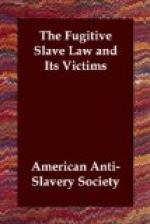of DANIEL ——. D. was a cook on
board the steamer “Buckeye State.”
He was engaged in his avocation, when Benj.
S. Rust, with a warrant from United States Commissioner
H.K. Smith, went on board the boat. Daniel
was called up from below, and as his head appeared
above the deck, Rust struck him a heavy blow,
upon the head, with a large billet of wood, which
knocked him back into the cook-room, where he
fell upon the stove and was badly burned. In
this state, he was brought before the Commissioner,
“bleeding profusely at the back, of the
head, and at the nose, and was moreover so stupefied
by the assault, that he fell asleep several times
during the brief and very summary proceedings.”
For most of the time he was unable to converse with
his counsel, and “sat dozing, with the blood
slowly oozing out of his mouth and nostrils.”
After a very hurried form, and mockery of a trial,
Daniel was ordered to be delivered to Rust, the
Agent of George H. Moore, of Louisville, Kentucky.
By a writ of Habeas Corpus, Daniel was
brought before Judge Coakling, of the United States
Court, at Auburn, who gave a decision that set
Daniel at liberty, and he was immediately hurried
by his friends into Canada. Rust was indicted,
in Buffalo, for his brutal assault on Daniel.
It was fully proved; he afterwards plead guilty, and;
was let off with the paltry fine of fifty dollars.
JOHN BOLDING, arrested in Poughkeepsie, New York, claimed as the property of Barret Anderson, of Columbia, S.C. Bolding was a young man, of good character, recently married, and had a small tailor’s shop in P. He said he was told, when a boy, that he was the son of a white man. He was tried before United States Commissioner Nelson, who ordered him to be delivered up to his claimants, and he was taken quietly from the city to Columbia, S.C. The sum of $2,000 was raised in New York, and paid to Bolding’s owner, who had consented to take that sum for him, and Bolding returned to his family in Poughkeepsie.
Christiana, Lancaster County, Penn., Sept. 1851. Edward Gorsuch, (represented as a very pious member of a Methodist Church in Baltimore,) with his son Dickinson, accompanied by the Sheriff of Lancaster County, Pa., and by a Philadelphia officer named Henry Kline, went to Christiana to arrest certain slaves of his, who, (as he had been privately informed by a wretch, named Wm. M. Padgett,) were living there. An attack was made upon the house, the slave-holder declaring (as was said) that he “would not leave the place alive without his slaves.” “Then,” replied one of them, “you will not leave here alive.” Many shots were fired on both sides, and the slave-hunter, Edward Gorsuch, was killed.
At a subsequent trial, a number of persons (nearly forty) were committed to take their trial for “treason against the United States, by levying war against the same, in resisting by force of arms the execution of the Fugitive Slave




